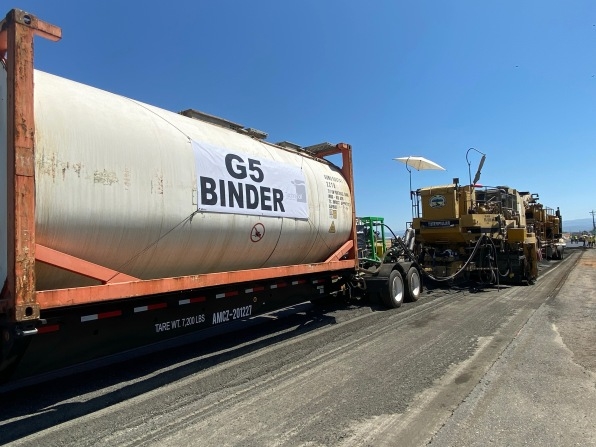This California highway is now paved with plastic
A newly repaved stretch of highway in Oroville, California, looks like an ordinary road. But it’s the first highway in the country to be paved in part with recycled plastic—the equivalent of roughly 150,000 plastic bottles per mile of the three-lane road.
The change in materials makes the pavement stronger. “Traditional asphalt roads rely on rock for the strength of the road,” says Sean Weaver, president of TechniSoil, the startup that engineered the new type of pavement. “With our pavement, it relies on the matrix of a plastic binder for the strength, and the rock is simply a filler.” The new type of road resists potholes and cracking and can last two to three times longer than standard asphalt.

The company’s process begins with PET, the common form of plastic found in plastic bottles and other single-use packaging, and chemically recycles it back into its original form of polymer chains. That then becomes a binder engineered to hold recycled asphalt together. In the Netherlands, another company has experimented with recycled plastic to pave roads, beginning with a bike path.
To repave a road, workers use equipment that grinds up the top layer of pavement, and then they mix that old pavement with the recycled plastic. California already recycles roads, but the normal process uses bitumen—sludge from oil refining—and the resulting road is weaker, so new material has to be added. Using current methods, repaving a single lane-mile can require bringing in 42 truckloads of new material and hauling out another 42 truckloads of waste. “The advantage with recycling in place is that we avoid all of the truck traffic in and out of the construction zone,” Weaver says. That eliminates the emissions from those trips and makes it faster to complete the job. “We can do this work very seamlessly at night.” The standard process requires heat, but the new process works cold, saving more energy.
The company is also working with Los Angeles to pilot plastic roads and will soon expand elsewhere in California as it works with CalTrans, the state transportation agency. In Oroville, where a 1,000-foot segment of highway was repaved, “we finished the first piece (August 10, 2020),” Weaver said on July 31. “And we already have a call slated for Monday to look at project number two and project number three. They are going at hyperspeed on this. California has some ambitious goals for recycling and environmental priorities.”
(32)



